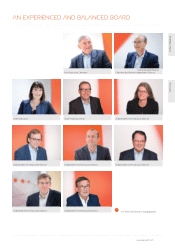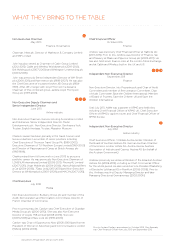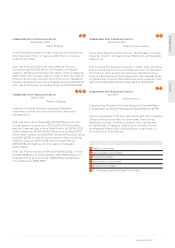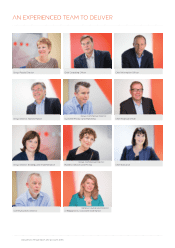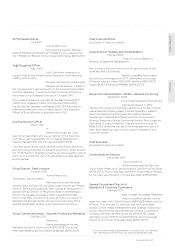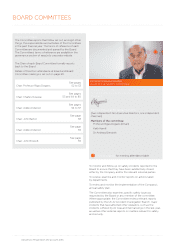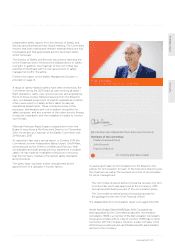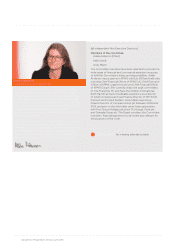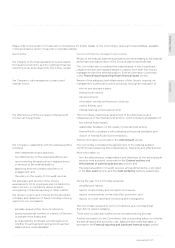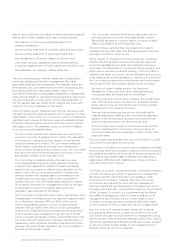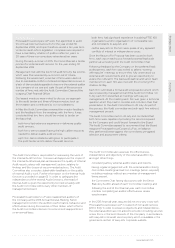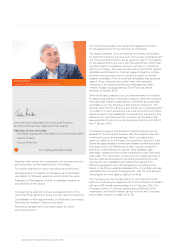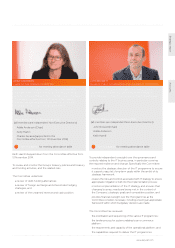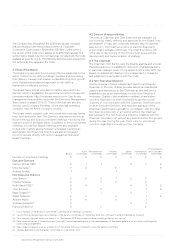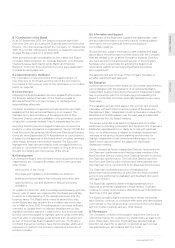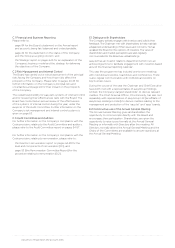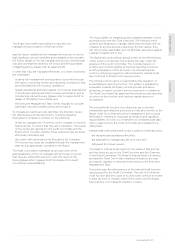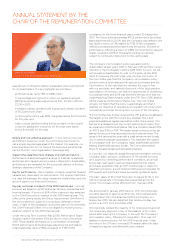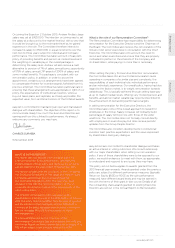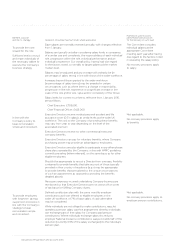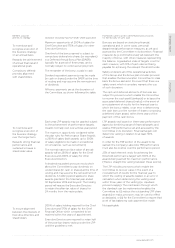EasyJet 2015 Annual Report Download - page 61
Download and view the complete annual report
Please find page 61 of the 2015 EasyJet annual report below. You can navigate through the pages in the report by either clicking on the pages listed below, or by using the keyword search tool below to find specific information within the annual report.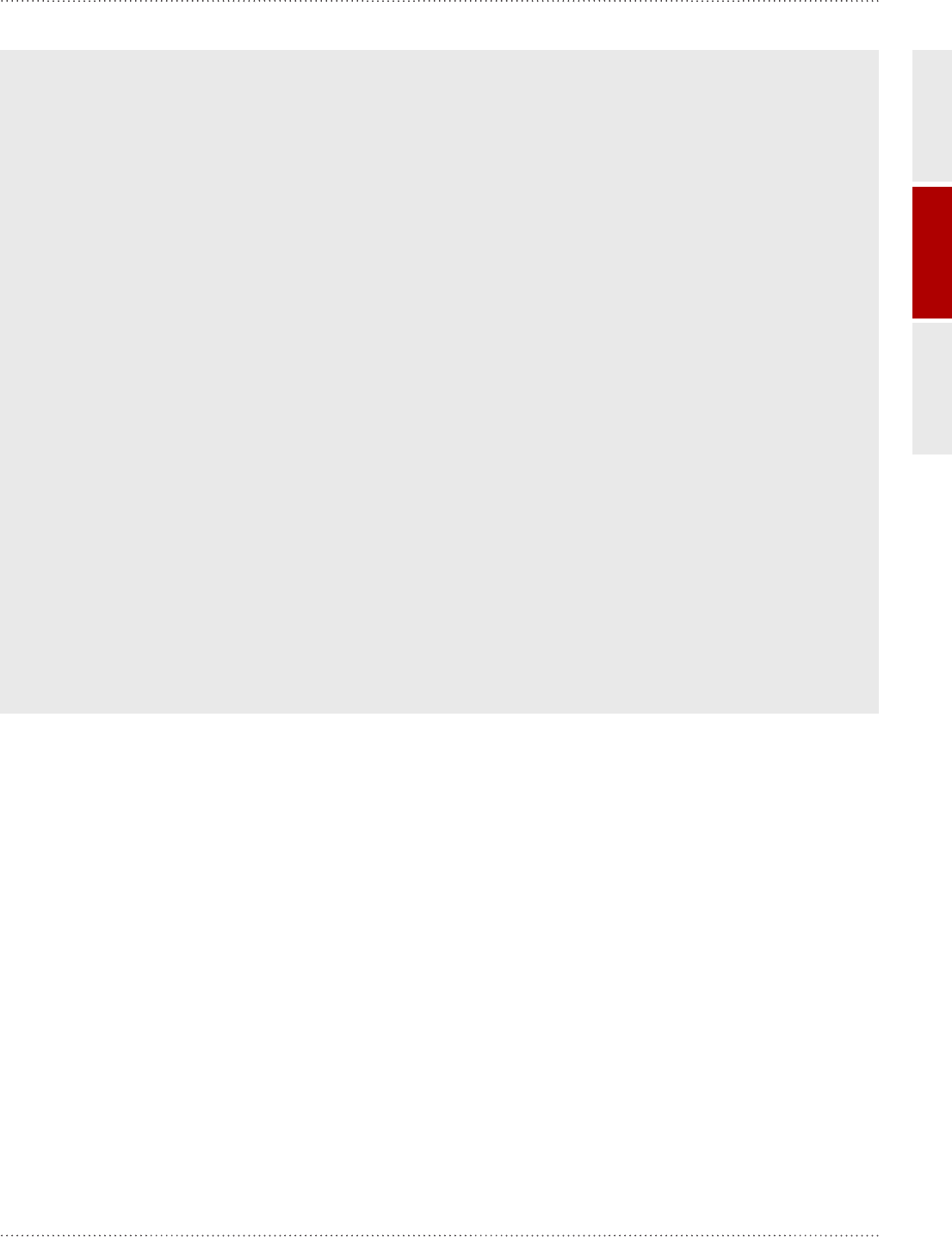
Strategic report Governance Accounts
57
www.easyJet.com
Internal Audit
The Audit Committee is responsible for overseeing the work of
the Internal Audit function. It reviews and approves the scope of
the Internal Audit annual plan and assesses the quality of Internal
Audit reports, along with management’s actions relating to
findings and the closure of recommended actions. The Audit
Committee also considers stakeholder feedback on the quality
of Internal Audit’s work. Further information on the Internal Audit
function is provided on page 63. In order to safeguard the
independence of the Internal Audit functions, the Head of
Internal Audit is given the opportunity to meet privately with
the Audit Committee without any other members of
management present.
External auditors and effectiveness of external audit process
PricewaterhouseCoopers LLP were reappointed auditors of
the Company at the 2015 Annual General Meeting. Senior
management monitors the auditors’ performance, behaviour and
effectiveness during the exercise of their duties, which informs
the Audit Committee’s decision to recommend reappointment
on an annual basis.
Audit tendering
PricewaterhouseCoopers LLP were first appointed to audit
the Annual report and accounts for the year ended 30
September 2006, and have therefore served a ten year term.
Under EU audit reform legislation, companies are required to
have a mandatory rotation of auditors after ten years, or
20 years if there is a compulsory retender at ten years.
During the early summer of 2015, the Committee led a tender
process for external audit services for the year ending 30
September 2016.
Management met with the top 10 UK audit firms by fee income,
which were then assessed by a common set of criteria.
Following this assessment, a number of firms were ruled out
due to irresolvable conflicts of interests/independence issues or
a lack of demonstrable appetite to become the external auditor
to a company of our size and scale. As part of this process a
number of firms met with the Audit Committee Chair and the
outgoing Chief Financial Officer.
Our largest investors were invited to discuss our approach
to the audit tender and three of these investors took up
the invitation and contributed to our considerations.
In May the Audit Committee reviewed the investor feedback
and the feedback from the meetings with the firms. It was
concluded that two firms should be invited to tender on
the basis that:
• both firms had extensive experience in delivering quality
audit services;
• both firms demonstrated having the high calibre resources
needed to deliver quality audit services;
• each firm demonstrated a willingness to participate in
the audit tender and to deliver the audit services;
• both firms had significant experience in auditing FTSE 100
organisations and/or organisations of comparable size
and complexity to easyJet; and
• neither easyJet nor the firm were aware of any apparent
conflicts of interest or independence issues.
Once the Request For Proposal had been issued to both
firms, each was invited to put forward potential lead audit
partners at a meeting with the Audit Committee Chair.
Following feedback by the Company on the preferred lead
audit partners, each firm was invited to attend “working
with easyJet” meetings to ensure they fully understood our
external audit requirements and to give an opportunity to
assess the cultural fit. The lead audit partner and senior team
members from each firm also met with the incoming CFO,
Andrew Findlay.
Each firm submitted a formal audit proposal document which
was reviewed by management and the Audit Committee. On
6 July each firm presented at meetings with easyJet
management. At this meeting each firm was given a technical
question which they had to consider and include in their final
presentation to the Audit Committee on 20 July. As part of
this process, the Audit committee met with each firm without
management present.
The Audit Committee met on 22 July and concluded that
both firms were capable of providing the services required
by the Company and could be put forward to the Board.
The Audit Committee agreed to recommend that the Board
reappoint PricewaterhouseCoopers LLP as, on balance,
they performed better against the committees pre-agreed
selection and assessment criteria.
The Audit Committee also assesses the effectiveness,
independence and objectivity of the external auditors by,
amongst other things:
• considering all key external auditor plans and reports;
• having regular engagement with the external auditor during
Committee meetings and ad hoc meetings (when required),
including meetings without any member of management
being present;
• the Committee Chair having discussions with the Senior
Statutory Auditor ahead of each Committee meeting; and
• following the end of the financial year, each Committee
member completing an auditor effectiveness review
questionnaire.
Non-audit services
In the 2015 financial year, easyJet did not incur any costs with
PricewaterhouseCoopers LLP in respect of non-audit services
(2014: £nil). In order to preserve objectivity and independence,
the external auditors are not asked to provide consulting services
unless this is in the best interests of the Company, in accordance
with easyJet’s non-audit services policy which is available in the
governance section of easyJet’s corporate website,
http://corporate.easyJet.com.


